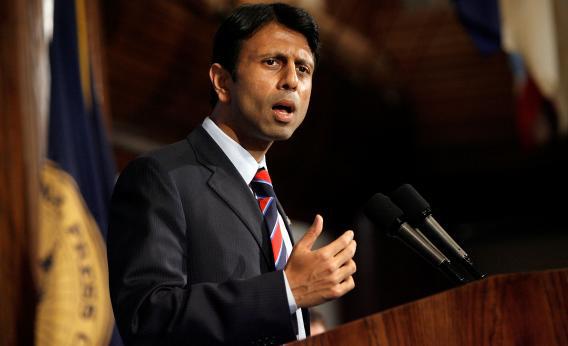The governor of Louisiana is nothing if not on message. In November, one week after Mitt Romney lost the presidency, Bobby Jindal gave a 45-minute interview to Politico about the GOP’s way forward. Last night, he gave a slightly shorter speech to the Republican National Committee. Compare, contrast.
Jindal to Politico, three months ago:
We’ve got to make sure that we are not the party of big business, big banks, big Wall Street bailouts, big corporate loopholes, big anything. We cannot be, we must not be, the party that simply protects the rich so they get to keep their toys
Jindal last night:
We are not the party of big business, big banks, big Wall Street bailouts, big corporate loopholes, or big anything. We must not be the party that simply protects the well off so they can keep their toys.
Jindal to Politico, three months ago:
It is no secret we had a number of Republicans damage our brand this year with offensive, bizarre comments — enough of that.
Jindal last night:
We had a number of Republicans damage the brand this year with offensive and bizarre comments. We’ve had enough of that.
At the time, a lot of snarky reporters (here I raise my hand) pointed out that Jindal was talking about messaging, but not getting specific about what the GOP might need to change, policy-wise, to bring back voters. In three months, he hasn’t added anything to the pitch.
Jindal’s Sermon on Gaffes assumes that the audience still blames Mitt Romney’s “47 percent” tape for his defeat, and blames Todd Akin’s “legitimate rape” comment for blowing the key Senate races. Sure: Both were huge, inarticulate mistakes.
Romney’s spitballing about makers and takers was in line with contemporary Republican theories about the tax code and the entitlement state, and Jindal doesn’t back off from them, either. “Where do you go if you want a handout?” he asks. “Government. This must stop.” He doesn’t mention entitlement spending except to call for “re-thinking nearly every social program in Washington.”
Akin’s gaffe was even more explicable. He believes that life starts at conception, and he’s against abortion in cases of rape. Jindal doesn’t talk about abortion at all, except to accuse liberals of “supporting abortion on demand without apology.” But in practice, he’s signed restrictions on abortion, requiring women to see ultrasounds and hear fetal heartbeats before they terminate their pregnancies. Following a 2012 law signed by Jindal, a woman can only opt out of the ultrasound results if she affirms in writing that she was raped or the victim of incest. But Jindal doesn’t go around talking about it.
